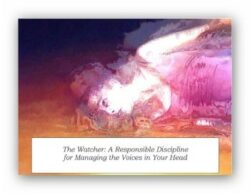Ceilings and The Dynamics of Depression — depression is simply a label, and for most of us, not a helpful one. Let’s explore depression and see if there’s a link between negative stories and depression.

This Endless Moment
An excellent guide to life and living.
Learn to focus your attention of who you really are.
Purchase all formats from Amazon
Purchase digital versions
(Apple, Nook, Kobo, etc.) from this page
So, I received a question:
“Recently started to follow your blog. I’ve been interested in Zen Buddhism for many years and enjoy your writing.
You frequently ask about suggestions on subjects, mine is depression. I’ve suffered it most of my life. Is this another series of stories that we tell ourselves?”
Delighted to make this our topic!
There are several things here. A little medical talk, a bit of autobiography, a slice of Zen — and we’ll see where we come out.
The Dynamics of Depression–Medical

We need, first of all, to differentiate between brain science and what the drug companies want us to believe.
There was an article some years ago, Newsweek, I think, that talked in glowing terms about how science was on the verge of being able to create designer brain drugs. All was going to be immediately fixable!!!
Two decades later, not so much.
Some years back, a researcher in Europe examined depression drug studies (Paxil, Prozac, etc.), and… shocker! Anti depressants are 2% more effective than placebos! In other words, they don’t work.
This is predictable, as much of what we call depression is actually not a brain chemistry issue, but sadness writ large.
Sounds so much more dramatic to be depressed than sad, though.
There’s likely 8% of the population that has significant brain chemistry issues — enough to need some form of medication.
Back in my youth, what is now called Bipolar Disease was called Manic-Depression. Treated, back then, with lithium. This is “true depression.”
One family friend was a classic “sufferer.” When in his manic stage, he was one of the best sales guys for Prudential Life Insurance. He’d bring home strangers, feed them, play pool with them. He’d figure, “I’m cured!” and stop taking the drugs.
Next thing you knew, he was strapped to a gurney in a hospital. Went on like clockwork, his entire adult life.
This is the real thing. Not, though, what most people, including me, label depression. read on!
The Dynamics of Depression–History

I had what I refer to as a depression, back in 1978. Sat in a reclining chair for 3 months, barely speaking, barely interacting. Almost non-functional.
BUT, I would say that it was not a true depression, as in something treatable with drugs. I was as miserable as I have ever been — and I also am painfully aware of how I cooked up the drama, and kept myself in it, plastered to that damn recliner.
After a couple of months, I decided to change what I could change — my behaviour — my actions.
I decided that my career as a photographer was over, and that I should get another degree. So, I went back to school, and became a minister. (Only a “depression” could lead to that choice, he says with a shudder…)
I followed that one up with a degree in Counselling.
I wrote a booklet, called “The Watcher,” to detail my process for dealing with depressive thoughts. It’s 99 cents, and available for download.
I made a decision about myself, and that decision was that my base-line personality is “not happy.”
A few years back, I read something from Pema Chodron, where she described herself as a “cheerful melancholic.” I thought that perfectly described me.
What I have learned, over the years, is that there is no altering one’s baseline “self.”
How we are, at several levels (things like mood and temperament, levels of pain tolerance, our place in the introvert — extrovert scale, etc) — these things are fixed — perhaps at the cellular level.
This is what brain scientists are attempting to “fix.” So much so that they’re doing clinical trials on a drug designed to “erase painful memories.”
I can see where that one is going. Who gets to decide what gets erased? Your doctor? The local Q‑Anon crowd?
We need to stop expecting drug companies to fix us.
It is no coincidence that, every time a study for a new “mind altering drug” comes out, the closing paragraph reads, “10–13 sessions of talk therapy is just as effective.”
Talking things through, getting a handle on the games we play — stunningly effective!
Here’s the Zen part
It is all about focus, as in, what we choose to “look” at.

I was watching the French movie, “Water Lilies” the other day. The protagonist and her girlfriend are lying in bed, staring at the ceiling.
The protagonist goes off on a “French-movie-like” speech (they have to have a philosophical nugget to be a “true” French movie…) about ceilings, and how
“The ceiling is probably the last thing most people see” before they die.
She went on about her guess that 90% of people die staring at the ceiling (as opposed, one thinks, to staring into one’s lover’s eyes…) and that the last thing you see is imprinted on your retina.
“Imagine the number of people with ceilings in their eyes.”
What you focus on becomes your reality, plain and simple. And the way we get lost, and end up focussing on the “ceiling,” is through our story-telling.
The question that kicked this article off alluded to this. Is depression a “series of stories?”
Zen, in a sense, would say “Yes, and so is everything else that is not ‘real.’”
Real is what is right in front of you, and sometimes, real is sad, heartbroken, angry, shut down. In other words, just what our society tells us we ought not to be.
Here’s how it plays out: we feel what we feel, and rather than keep it simple, and say, “Boy am I sad,” we think we are compelled to justify the feeling (any feeling.)
We invent “evidence” to support how we are feeling.
My personal favourite “stories that I tellmyself” are variants of
- I’m all alone and no one likes me, and
- I’m a failure, and it’s all my fault.
Now, I could tell you a story about growing up a favoured only child, and how I was treated as being superior to everyone, how I never learned to fail gracefully, etc. But they’d just be stories to support my stories.
In truth, when things don’t go my way (my story of how things ought to go,) I sadden myself, and sometimes anger myself. The anger comes out as, “I quit. I’m going to take my marbles and go home.”
I quickly head to the whole poor, unappreciated Wayne thing. I have been doing this since I turned 18.
If I let myself, one story builds upon another, and soon I’m recalling other times I’ve felt hard done by. In 1978, I pushed this drama so far that I ended up in the reclining chair.
These days, I find I’m not interested in my stories, at least not for very long

Sure, because my nature is melancholy, I see shades of gray where Darbella sees fuchsia. Our standing joke in Costa Rica was, Dar would say, “Que tal?” (how are you?) and I’d mostly reply, “Mas a menos,” (more or less — meaning OK-ish) while she mostly was “Muy bien” (great!)
Zen teaches us to simply observe — the feelings that arise, the stories we tell — and to let them drift past like clouds. Not easy, which is why meditation helps to get your ass settled down for the show.
You learn to watch without freaking yourself out — without adding another layer of story to defend what you do not want. You begin to explore your own dynamics of depression, to dissect them, to see them as simple mental games, and as you see this, you can choose to let them go.
Yes, choice
Being a sad-sack, a poor, helpless victim, is popular in our culture. And being depressed has cachet — better than, “I just decided to make myself miserable and then blame you!”
To admit you are blue, sad, angry, bored, etc. takes courage, as you will face the question, “Why?”
“Because it’s my nature” will cause others to, at least, raise their eyebrows.
But this is the case. What I feel is what I feel, and has nothing to do with the explanation I create. This is why, when confronting the same situation, 2 people react or respond differently. It’s not the situation — it’s the baseline personality and the stories.
I’m not making light of depression… true depression is debilitating.
I’m simply stating that most people who are sad are not depressed. I no longer find it helpful to claim depression, even though my behaviour was classic depression. The label leads in strange directions.
Instead of labelling, have a look at your patterns.
- What stories do you tell yourself, which are designed to make your present situation into a curse?
- How do you build upon what’s happening right now, (instead of simply dealing with it…) and end up with a life story that leads into a hole?
- Who do you blame, and what do you gain, by the repetition of the theme?
Explore your options, including accepting that maybe you’re just not wired to be “happy.” You likely, as I have, can find solace in contentment, while not freaking out that you’re often blue.
It’s not “about” anything. Accepting that, you, as I do, can make better, moment-by-moment choices to continue to engage fully, instead of running away, blaming, or sitting in a green Naugahyde chair.
Because while who we are at our cores is fixed, there’s always this moment… and choice.

Check out my booklet, The Watcher,” available for 99 cents. You’ll learn how to set up a Watcher voice to help you settle yourself when the voices in your head are giving you grief.





